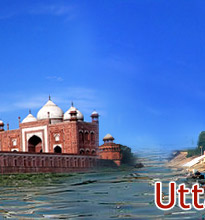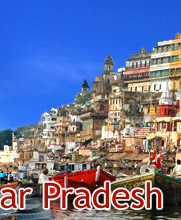 Frankly
speaking, Agra is the city of Taj and that is what the most important
and beautiful construction in the city. Having said that, there are
other beautiful buildings as well in Agra. These buildings have been
constructed in different eras and have subtle blend of different
architectural schools. These palaces, forts and tombs are worth visiting
for both researchers as well as casual visitors. Some of them are as
follows.
Frankly
speaking, Agra is the city of Taj and that is what the most important
and beautiful construction in the city. Having said that, there are
other beautiful buildings as well in Agra. These buildings have been
constructed in different eras and have subtle blend of different
architectural schools. These palaces, forts and tombs are worth visiting
for both researchers as well as casual visitors. Some of them are as
follows. Agra Fort
The fort's colossal double walls rise 20 meters in height and measure 2.5 kilometers in circumference. Typical of forts of Mogul era, Agra Fort is surrounded by a moat. The fort looks intimidating because of its lofty battlements that overlook the far stretching mansions of nobles and princes built along the riverfront. Another important and very significant structure is the dominating gateway that is surrounded by the magnificent towers, bastions and ramparts. The fort contains some of the most magnificent and subtle palaces both in red sandstone and white marble that has been built by two generations of prolific builders; Akbar and later on by Jahangir and Shah Jahan.
Itmad-ud-daula Tomb
Itmad-ud-daula has a special place in the chronicles of both history as well as architecture. This is precisely because Itmad ud Daula is the very first tomb in India that is entirely made out of Marble. This is actually a mausoleum that overlooks the River Yamuna and is a tomb of Mir Ghiyas Beg, a minister in the court of Shah Jahan.
Chini ka Rauza
Chini-ka-Rauza is considered a milestone in Indo-Persian architecture, as it is the very first building in India that has been exclusively decorated by the glazed tile works. The decoration is prominent on façade and exteriors. Chini-ka-Rauza is actually a small mausoleum that overlooks the River Yamuna. The tomb is a fine architectural example of pure and undiluted Persian architecture
Mehtab Bagh
350 years ago, when the Taj was built on the Yamuna's south bank, a moonlight garden called Mehtab Bagh was also laid just across the river. It was laid alongside the northern waterfront. The place was once an oasis with fragrant flowers, shaded pavilions, fountain jets and reflecting pools but it ceased to exist in the due course of history. Slowly, the site became barren.











